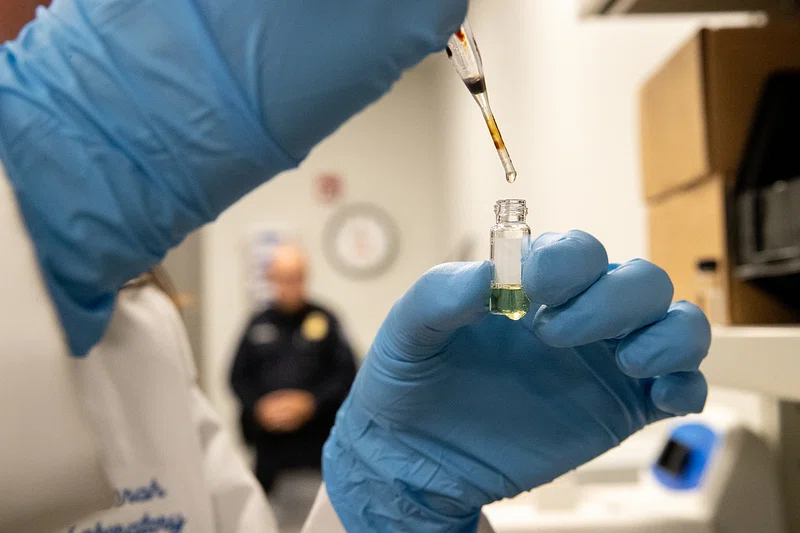Jane* didn’t think much about the Sam’s Club salad she’d eaten days before she was to give birth in March 2021. But the salad—covered in poppy-seed dressing—would land her on the New York State Central Register of Child Abuse and Maltreatment.
This subjected the new family to multiple, stressful visits from Child Protective Services, which removes thousands of children from their homes. There were 14,657 children in New York State foster care in June 2021 (the most recent available data). Most were under the age of 6.
One senior director of foster care told News 10 that year that the state was “at the forefront of trends in child welfare,” and attributed the high number of young kids in the system to parents’ drug use: “In our experience, one of the biggest drivers for the higher rate of children age 5 and younger in foster care is a result of parental neglect and maltreatment impacted by opioid and methamphetamine use.”
Back to the Sam’s Club salad. Without Jane’s permission or knowledge, staff at a health care facility in Upstate New York had administered a series of drug tests on a urine sample she gave when she went in for a possible urinary tract infection. The lab indicated a “presumptive positive” for opioids.
Even a poppy-seed bagel can be enough to trigger a false positive. According to a lawsuit filed by the organizations Pregnancy Justice and the New York Civil Liberties Union, even after Jane’s baby tested negative, her name remained on the child abuse register. The suit names another woman, Crystal H., as also having been drug tested without consent.
“Drug testing and its consequences subject parents to enormous fear.”
Garnet Health Medical Center (GHMC), operates multiple medical facilities in New York, including the one Jane attended. At each of them, obstetric patients were allegedly subjected to drug testing without their consent in recent years.
New York Attorney General Leticia James recently began investigating the secret drug testing, as Politico reported, submitting subpoenas to obtain patient records. In March, GHMC countered by asking a judge to block the subpoena, arguing that it’s overly broad and “appears to be motivated by political interests.”
Drug testing during or after pregnancy is still widespread in the United States. Consent is legally required in many contexts, but that’s often ignored and policies and practices vary by state.
Advocates point out that parental drug use does not demonstrate bad parenting, nor that a child is at risk. They emphasize that drug testing practices endanger the health and wellbeing of both parent and child.
“There are extremely negative consequences for maternal and infant health,” Emma Roth, senior staff attorney at Pregnancy Justice, told Filter. “Moms need to be together with their babies. They need skin-to-skin contact. They need to be able to breastfeed if they choose to.”
Roth, who is leading the lawsuit against GHMC, said her client desperately wanted to breastfeed but was denied by medical staff in the days after she gave birth, because of her false positive.
Jane may have had a false positive, but Roth stressed that pregnant people who use drugs should never be tested against their will, or subjected to punitive consequences as a result.
She said the worst thing you can do, in a case of physical withdrawal from opioids ingested in the womb, is to isolate a newborn baby. She pointed out that the recommended approach for newborn opioid withdrawal—which lasts a short time and does not present severe health risks—is skin-to-skin contact and breastfeeding, if possible. A 2010 study led doctors at Yale’s School of Pediatrics to shift to a Eat, Sleep, Console approach, which reduces the need for morphine treatment. Other medical facilities have followed suit.
“Drug testing and its consequences subject parents to enormous fear,” Roth added. “Instead of being happy about meeting their baby, they’re terrified their baby will be taken away.”
“A drug test is not a parenting test.”
The American Medical Association and American College of Obstetricians and Gynecologists both oppose non-consensual drug testing and punitive consequences during pregnancy, and call instead for voluntary, science-based care.
“Pregnant people in pain or struggling with substance use need comprehensive support and treatment, not judgment,” said Dr. Bobby Mukkamala, chair of the AMA Substance Use and Pain Care Task Force in a 2023 statement. “But judgment is often what they unfairly receive from some laws and statutes that imply any indication of substance use by a pregnant individual is automatically representative of child abuse.”
“Research has found that non-punitive public health approaches to treatment result in better outcomes for both pregnant individuals and babies,” he added.
Misogyny is one major factor behind punitive approaches to pregnancy and parenting. Racism is another, which has led to initiatives like Black Maternal Health Week, which took place from April 11-17.
Families of color are disproportionately separated by child protective systems. And Black people are tested at far higher rates than white people during pregnancy. The consequences include broken trust in doctors, which can discourage people from seeking prenatal treatment, putting their lives at risk.
“Black birthing people are three times as likely to die as white,” Jasmine Sankofa, executive director of the Movement for Family Power, told Filter. She described a slew of potential nightmares if someone’s drug test is positive, from having their baby and other kids taken away, to incarceration. And for what?
“A drug test is not a parenting test,” Sankofa observed. “Overall, fuck that.”
*A pseudonym; the person’s name is redacted from the lawsuit.
Correction, April 29: The original version of this article repeated a claim, taken from reporting elsewhere, that AG James was collaborating with the ACLU/NYCLU in her investigation. This is in fact not true.
Photograph via Rawpixel





Show Comments